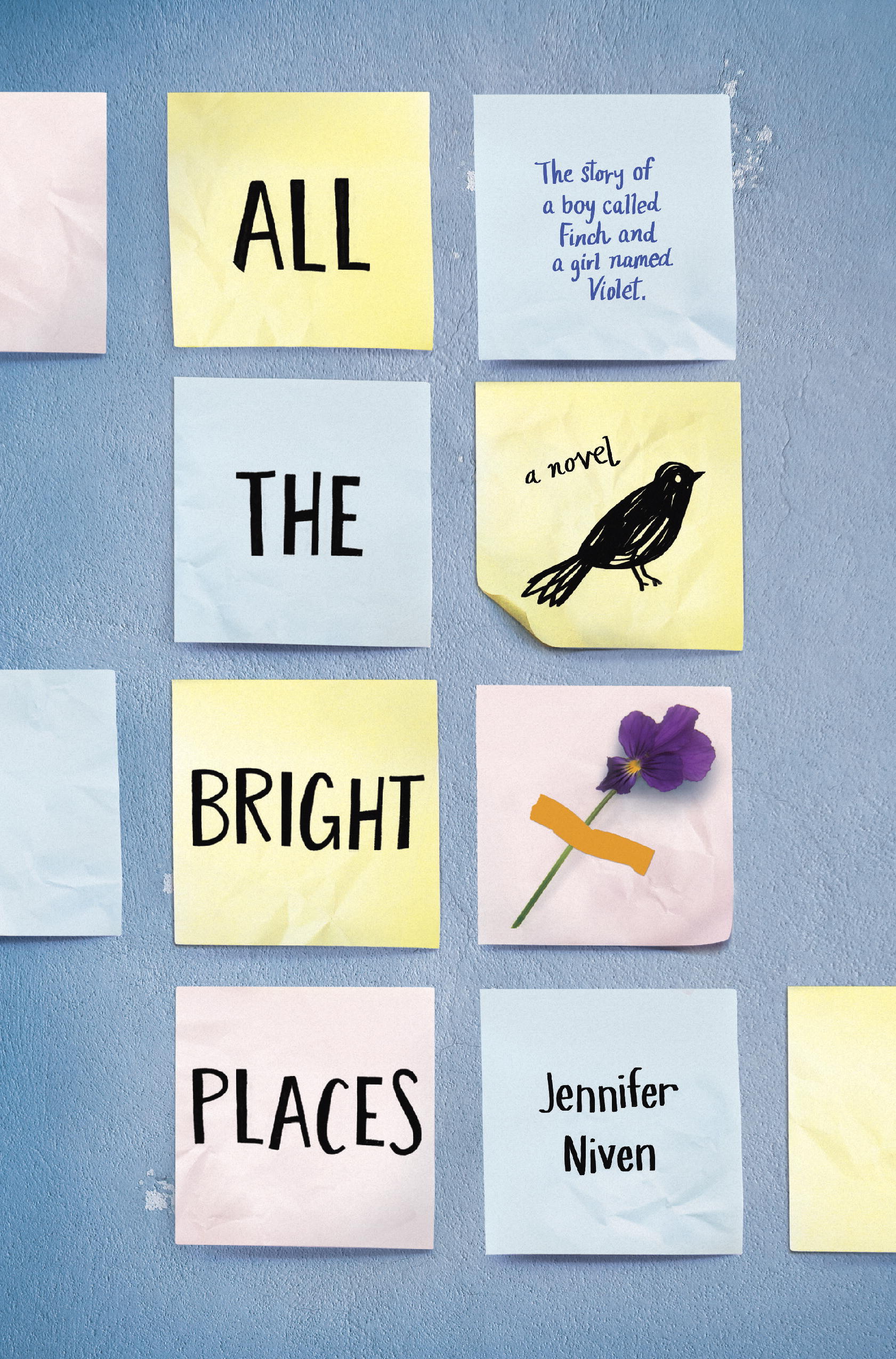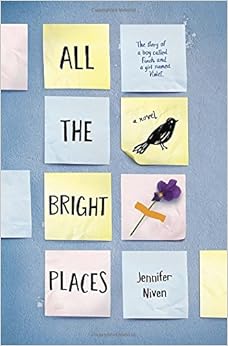Introduction:
The beautiful lady you see to your bottom right is the author I will be interviewing today. Not only is she absolutely gorgeous, she has written one of my top favorite books of all time, and one that I will be recommending to every single soul on the face of this Earth forever and ever. [My review is coming tomorrow, for those of you who are utterly confused.] Although she has written other novels, the one we are particularly interested in today is entitled All The Bright Places, a story of two teens who find one another at one of the oddest places to say hello, who start to find themselves in the process of finding each other. None of these questions should have any spoilers, [I think] so please go ahead and enjoy. Thank you, Jennifer, for stopping by today!
The Basics:
Favorite Song: "Dancing Queen" by ABBA or any One Direction song, especially “One Thing.”
Favorite Ice cream Flavor: Cookie dough
 Ideal Super Power: I'd love to be able to move things with my mind, but teleporting would be really, really cool too.
Ideal Super Power: I'd love to be able to move things with my mind, but teleporting would be really, really cool too.
Favorite Quote: Is it awful to pick one from my own book? Because I love "You are all the colors in one, at full brightness." It's true of everyone, and we all need to remember that.
The Interview:
Oscar Wilde once said, “To live is the rarest thing in the world. Most exist, that’s all.” At the beginning of the book, Violet and Finch think they have little to live for, and are simply existing. How do you think, during the duration of All The Bright Places, that they help each other find a reason to live instead of simply exist? How do you think they change throughout the beginning until the end?
Finch tells Violet the reason he wanted to work with her on their class project is because she smiled at him, but it’s so much more than that. Violet is the first person who truly sees Finch. As he says, she’s able to look past everything else and love him anyway so that, for the first time, he feels like “A boy who belongs—here in this world, here in his own skin. He is exactly who I want to be… The boy Violet Markey loves.” As for Violet, by the time she meets Finch, she has closed herself away from everyone and everything as she struggles in the wake of her sister’s death. But Finch gets her back on the camel, so to speak, by challenging her, by not coddling her like her teachers and her parents and her friends have done, by forcing her to engage with life, and in doing so he teaches her to see the people and places around her in new ways. Together they learn the importance of making it lovely and leaving something behind. They learn firsthand about acceptance in spite of everything, and they realize that you can be your own bright place in the world.
In All The Bright Places, Violet and Finch both quote various works of literature, (especially Violet) from the classics to the infamous Dr. Seuss. What is a quote from a piece of literature that you’ve always liked?
 There are too many to choose from, but here is one I love from Alice’s Adventures in Wonderland: “Why, sometimes I’ve believed as many as six impossible things before breakfast.” I also love: “She is too fond of books, and it has turned her brain.” (From Little Women.)
There are too many to choose from, but here is one I love from Alice’s Adventures in Wonderland: “Why, sometimes I’ve believed as many as six impossible things before breakfast.” I also love: “She is too fond of books, and it has turned her brain.” (From Little Women.)
Finch has a wall full of post it notes with random words that he rearranges into lines or song lyrics. Choose at least fifteen different words and list them. If you can, try to rearrange them into a line of a song or poem.
Lovely
Bright
Home
Possibility
Endless
Life
Forever
Together
Two
Choose
Words
Horizon
Celebration
Forgiveness
Resilient
Memory
Hope
Believe
And my poem:
“Horizon”
Believe life forever,
Two together,
Choose Words:
Celebration,
Forgiveness,
Hope.
Resilient home,
Lovely memory,
Endless bright possibility.
In your Author’s note, you mentioned that some of the events that happened in All The Bright Places are based on some experiences in your own life. To all our readers out there who might think that they are worthless and alone, and like nobody loves them, please try to explain how it feels to be the one left behind, how it truly feels to lose someone you love, and how much they really have an impact on your life.
Years ago, I knew and loved a boy, and that boy was bipolar. I witnessed up-close the highs and lows, the Awake and the Asleep, and I saw his daily struggle with the world and with himself. Like Violet, I was forever changed when I lost this boy. It took me years to get past it, to be able to think about him or drive down the street where he lived (and where I found him). It took me years to open up, to forgive myself for not seeing what he didn’t want me to see, for not saving him. As Emily Brontë writes in Wuthering Heights, “I have not broken your heart—you have broken it; and in breaking it, you have broken mine.” He broke my heart by dying. I still miss him. I wish he were here. I still have nightmares about his death. It is the worst kind of loss because he mattered. He was loved. There was nothing worthless about him. I wish he’d believed that. I want readers to believe that about themselves. You matter. You are loved. You aren’t worthless. You are the only you there will ever be in this world, and not only are you a bright place to someone, you’ll be a bright place to many more in the years ahead.
Was it ever difficult to write from Finch’s point of view, especially when he was having a particularly depressing time? How did you make these emotions seem real?
Overall, I actually found Finch’s POV easier to write than Violet’s. His voice was always stronger to me, although it was definitely challenging to write his unraveling, simply because it was so personal. A young writer asked me recently, “How did you write All the Bright Places without crying over it?” The answer is that I did cry while writing it, but I also knew that it was okay to cry because that meant I was tapping into all of the emotion that was going to help me write what I needed to write. In the end, I really just wrote the story I knew, based on the boy I loved.
What is the message you hope will touch the hearts of your readers/ the message you hoped to give when you finished writing this book? Do you have a message you would like to leave with us or any final thoughts?
One reader wrote to tell me that as soon as she read the book, she ran downstairs and hugged her mother. Another reader wrote, “I found after reading this that I wanted to do so much more with my life than just live. This has kick started the bucket list for me.” I hope that the book inspires more of those feelings. I also hope it inspires us to look deeper at the people and places around us. And I hope it inspires discussions about teen mental health. I want readers to know that they aren’t alone, that help is out there, that it gets better, that high school isn’t forever, and that life is long and vast and full of possibility.





